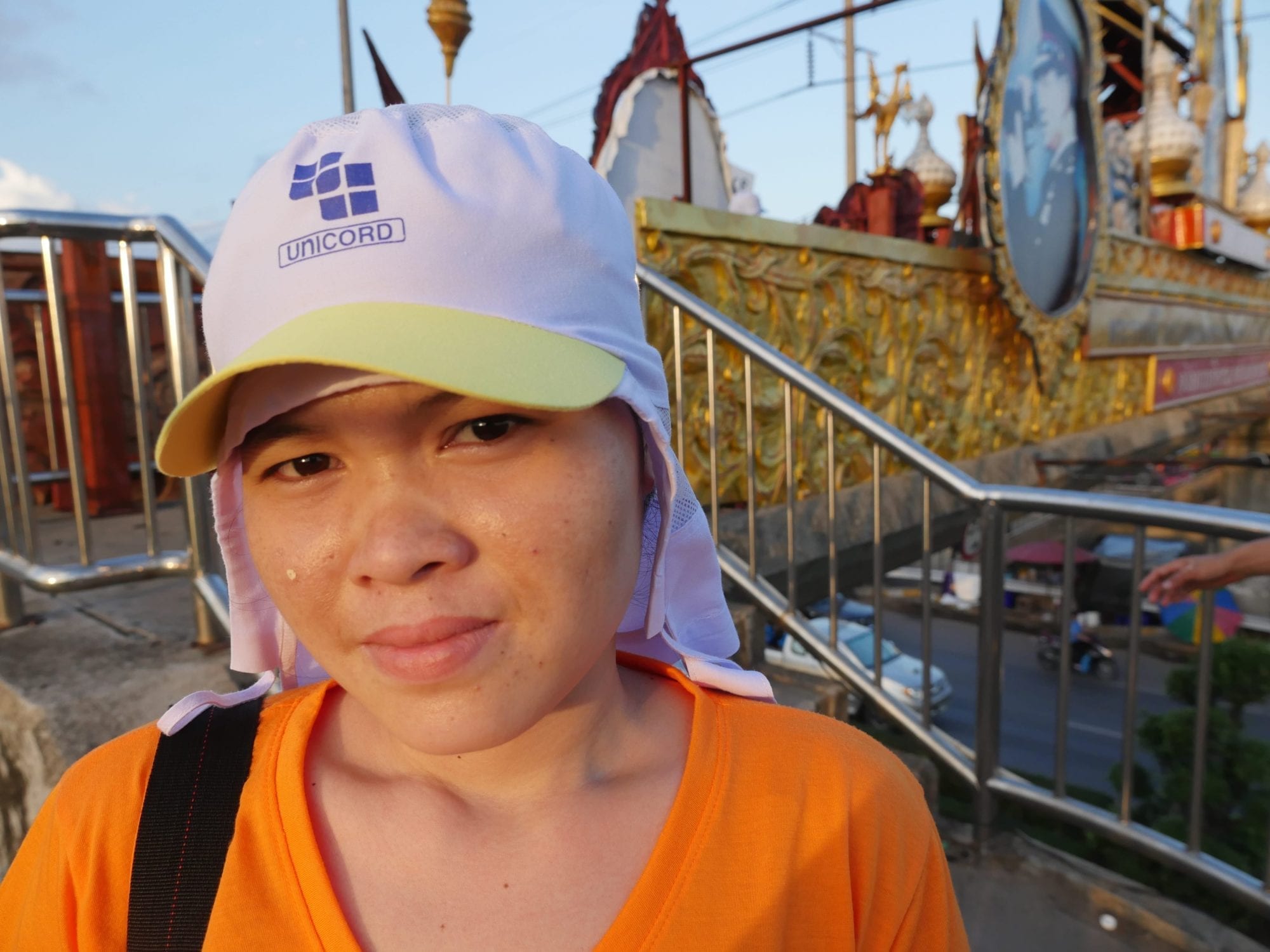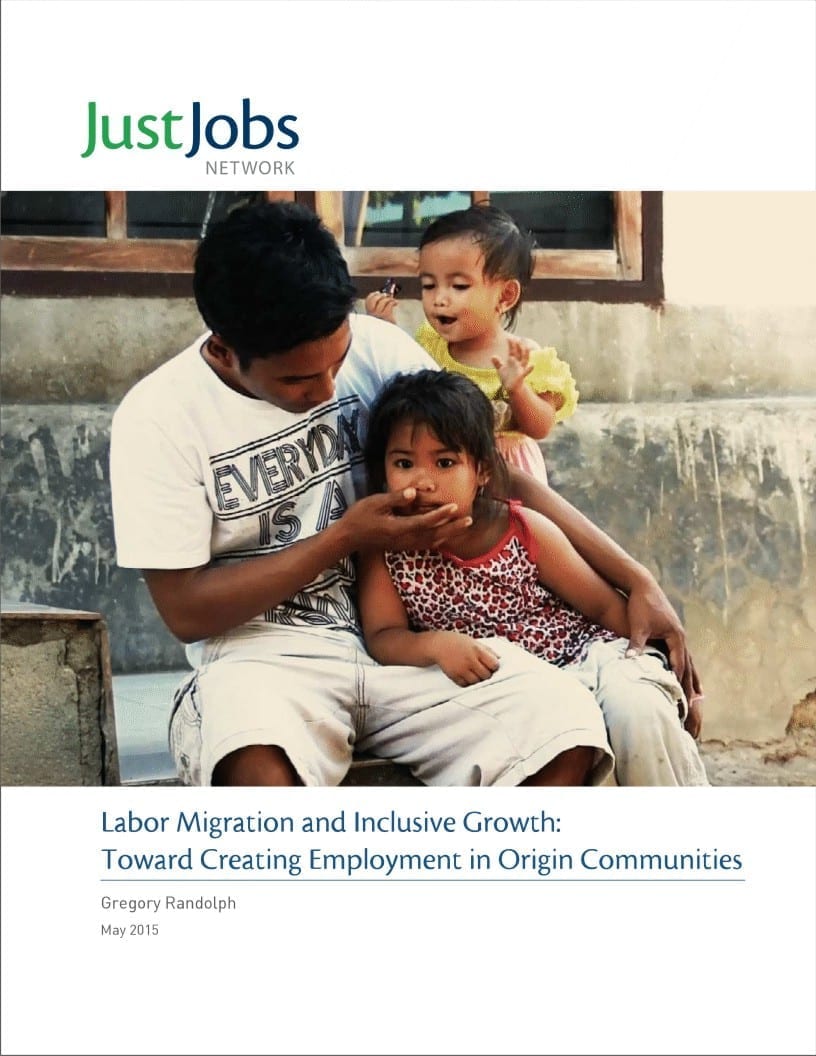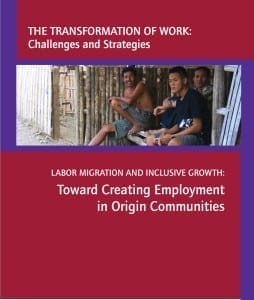
Jan 31, 2018
After spending seven years in Jordan as a domestic worker, Suryanti sought to return home to Indonesia to see her family. But her original employer, whom she left under duress, had confiscated her passport and would not give it back, leaving Suryanti in legal limbo as she tried to leave the country.
Securing a new passport required months of court filings and, ultimately, four-and-a-half-months in a detention center in Amman before Suryanti was allowed to leave the country. While confined, officials took her mobile phone, and she had no means to initiate communication with anyone.
In fact, some migrant workers who are jailed for not paying visa overstay fines in Jordan end up in detention for years. A survey found some 55 percent of migrant workers in detention were held between three weeks and four months, 18 percent for five to 11 months, and 5 percent for between one and two years.
“I didn’t know how long I would be there,” Suryanti says, describing her months in detention. “I was frightened.”
Jordan Domestic Workers Network

Now back in Indonesia, Suryanti plans to assist migrant domestic workers know their rights. Credit: Suryanti
With few legal rights in Jordan, domestic workers like Suryanti, 32, have been trying to improve the lives of migrant domestic workers with education, awareness training and legal aid through the Jordan Domestic Workers Network. Some 400 domestic workers have benefited from the network’s services, including 180 members from Bangladesh, Ethiopia, Ghana, Indonesia, Kenya, Philippines and Sri Lanka. Suryanti, one of the founding members, says she has helped some 200 Indonesian migrant domestic workers take part in network activities, a task she undertook “because we have the same problems.”
Formed in 2014, the network is the first organization to bring together migrant domestic workers in the region, where countries typically prohibit migrant workers from forming or joining formal trade unions and negotiating with employers to improve wages and working conditions. Through the network’s partnership with the International Domestic Workers Federation (IDWF), migrant workers also are connected with IDWF affiliates in some countries of origin. A key draw for domestic workers is the legal clinic with the Adalah Center for Human Rights Studies.
Jordan and other Middle Eastern countries operate under a kafala system, in which worker visas are tied to a particular employer, essentially inhibiting workers from reporting abuse and denying them the ability to change jobs. Employment contracts can only be terminated if both parties agree, if the duration of the contract has expired, or if the worker dies or is no longer capable of working due to a disease or disability certified by a medical authority. In practice, this means workers seeking to leave abusive employers often cannot get their permission and so are forced to seek employment elsewhere, without their passports.
Further, employers are responsible for annually renewing the work and residency permits of their employees, yet migrant workers are required to pay fines—$64 per month, nearly half the monthly salary of many workers—when employers do not renew the permits and they expire.
“Almost always, the original employer keeps our passport,” Suryanti says, speaking from Jakarta, where she now lives. “I don’t know why the original employer didn’t give us our passport because a passport is our right.”
Migrant Domestic Workers Vulnerable to Abuse on the Job
Migrant domestic workers from Indonesia and elsewhere not only are at risk of having their passports confiscated by employers, but often endure overwork and physical abuse, isolated in their employers’ homes.
A first-ever nationwide survey of Indonesian migrant workers by the World Bank gives a glimpse into the working conditions of all migrant domestic workers in the Middle East. The 2017 survey found some 26 percent of Indonesian migrant domestic workers in the region endure long working hours, 52 percent do not receive any days off, and 88 percent are not paid for overtime work. Suryanti says she left her first employer’s house after three months because in addition to cleaning the house, she was forced to clean the houses of the employer’s mother and sister, and was never allowed to rest.
“They always make me work, work, work, but you know, I am a human,” she says.
Between 440,000 and 540,000 migrants work in Jordan, according to the International Labor Organization (ILO). More than 9 million Indonesians work abroad—nearly 7 percent of Indonesia’s total labor force (only China and the Philippines send more workers abroad). Roughly 40 percent are domestic workers and caregivers, and each year this predominantly female migrant workforce contributes 51 percent of total remittances sent to Indonesia.
Migrant workers also are at risk when they connect with unscrupulous labor brokers who make false promises about wages and working conditions. Suryanti says a labor broker in Indonesia told she would get a job abroad working in an office for $250 a month. Instead, she was forced to toil as a domestic worker for $150 a month. “I didn’t know I would be domestic worker,” she says.
Suryanti ultimately worked for several employers, most of whom abused and overworked her, and often would not pay her.
Despite her struggles, Suryanti remained active in the network, assisting domestic workers whenever possible. She attended English classes to improve her mastery of the language to better assist other domestic workers, and joined a training on care giving with migrant domestic workers from the Philippines to improve her work skills.
Now working as a cook and translator for an employee of a Middle Eastern embassy in the Indonesian capital, Suryanti is connecting with migrant workers and the Indonesian Migrant Workers Union (SMBI), where she plans to continue her efforts ensuring those working in isolation have the power of solidarity.

Aug 13, 2015
More than 200 participants from 45 countries took part in Labor Migration: Who Benefits? A Solidarity Center Conference on Worker Rights & Shared Prosperity Aug. 10-12, sharing strategies on empowering migrant workers through organizing unions and associations, reforming the often exploitative labor recruitment process and ensuring access to justice for migrant workers.
Driving the dedication, passion, commitment of the activists who assembled in Bogar, Indonesia, over these past few days are the stories of migrant workers–whose strength, resilience and hope for improving their lives fuels their search for good jobs to improve the lives of themselves and their families.
Several migrant workers described their struggles and successes, via video, throughout the conference. Here are their stories.

Jun 10, 2015
 Governments of migrants’ countries of origin could be doing much more to harness the phenomenon of labor migration toward inclusive growth, according to a new report that investigated high-migration communities in Indonesia.
Governments of migrants’ countries of origin could be doing much more to harness the phenomenon of labor migration toward inclusive growth, according to a new report that investigated high-migration communities in Indonesia.
The study, which examined the role of labor migration in achieving the aims of an inclusive growth agenda in origin countries, looked at communities in West Nusa Tenggara, the Indonesian province that sends the highest ratio of its population for overseas work. It found that wages sent home by Indonesians who migrate for work are not supporting local job creation in origin communities. Further, it finds that the poorest communities in Indonesia are most likely to send migrants into informal economy jobs.
“Remittance capital (the money sent home by migrant workers) has not stimulated broad-based economic development complete with an increase in job opportunities … in spite of migration from these localities of more than 30 years,” the report states. As a result, “community members cannot envision a future in which the demand to migrate has ceased.”
“Labor Migration and Inclusive Growth: Toward Creating Employment in Origin Communities” also found that Indonesian workers’ main incentive for migrating out of the country is not dire poverty nor lack of jobs at home but a lack of just jobs—those that provide a stable salary and opportunities for economic mobility.
While Indonesia is facilitating a slow transition in its overseas workforce from informal economy work to jobs in the formal economy, migrants from West Nusa Tenggara, who are among the poorest and primarily women, still have few options except jobs as domestic workers. The uneven pattern of international migration across the country is a result of inequitable access to education, training and capital across regions at home.
While Indonesia is facilitating a slow transition in its overseas workforce from informal economy work to jobs in the formal economy, migrants from West Nusa Tenggara, who are among the poorest, are primarily women and still wind up in jobs as This uneven pattern of international migration across the country is a result of uneven access to education, training and capital across regions at home.
“The [Indonesian] government sees return migrants primarily as consumers rather than producers. Moreover, it values remittances more for their ability to improve Indonesia’s balance of payments and reduce foreign exchange shortages, rather than for their potential to serve as start-up capital for job-creating enterprises,” the report notes.
The report concludes that an “economic growth agenda in countries like Indonesia that does not entail a roadmap for creating employment opportunities in communities of origin lacks inclusivity.”
JustJobs Network produced the report, supported by the Solidarity Center with U.S. Agency for International Development funding. The report is part of the Center’s Transformation of Work research series, which is designed to expand scholarship on and understanding of issues facing workers in an increasingly globalized world, and supports the efforts of the Solidarity Center and its partners to document challenges to decent work and the strategies workers and their organizations engage to overcome those challenges.
See all Solidarity Center-supported reports on migration.

Jan 7, 2015
Sumbawa, a rural region in eastern Indonesia, offers residents little opportunity to make a living, and many migrate to neighboring Malaysia and Singapore for work.
“If we don’t go, we don’t have a job,” says Pak Syamsul, who worked in Malaysia for more than two decades before returning to Sumbawa. “There really isn’t much employment here. Nothing. That’s why people leave.”
Globally, there are an estimated 232 million migrants in the world, the overwhelming majority who migrate for work. More than 6 million Indonesians work abroad, and in 2013, their remittances to their families brought $7.4 billion into the Indonesian economy.
Each of those migrant workers has a story, and a new film by JustJobs takes a close-up look at those who, like Syamsul, travel far to support their families. “Pulang Pergi” (“Going Home to Leave Again”), based on research supported by the Solidarity Center, illustrates the cost and opportunities for migrant workers and their communities.
Faisa Trisnawati, 27, is among those who migrated for a job. She worked two years in Jordan and six years in Saudi Arabia, financially unable to pursue her dream of higher education.
“I think a lot about the future, about my children, because I myself couldn’t get an education,” says Trisnawati, as her 4-year-old daughter, Nabila, played nearby. “My aspirations were never realized. I want my children to be able to accomplish anything. Not like me, becoming a migrant worker abroad …”
Working as a farmer in Sumbawa is impossible, she says, because the cost of renting land and buying supplies would exceed income. Rich with agricultural potential, Sumbawa highlights the complex and often conflicting pressures underlying global labor migration, a region that received $1.4 million in remittances in 2013 and where its residents are forced to leave.
The Solidarity Center is supporting research on key migrant worker rights issues–examining how workers migrate and under what terms–both of which are critical questions for global economic and social development. As a worker rights organization, we seek to advance labor migration that promotes shared prosperity by lifting up and empowering workers in both origin and destination countries.
Dec 18, 2013
From the moment Yani arrived in Malaysia for her job as a domestic worker, she toiled for a solid year with no break. Her day started at 4 a.m. and went long into the night, seven days a week, as she cleaned and took care of her employer’s child. Yani eventually became too ill to work, and her employer sent her back to her labor agent in Indonesia. The agent deducted two months’ salary from Yani to pay for her trip back home and abandoned Yani at a port, ill with hepatitis and far from her home. When Yani eventually made it to her village, she had $1 left, just enough for a plate of rice.
Yani is one of 400,000 workers from the Indonesian archipelago who leave their homes every year in search of jobs to support themselves and their families. Globally, up to 100 million people are working outside their home countries, nearly half of them women. Migrant workers contribute to the economies of their host countries, and the remittances they send home help to boost the economies of their countries of origin. Yet migrant workers often enjoy little social protection and are vulnerable to exploitation and human trafficking. Many, like Yani, also are exploited by unscrupulous labor agents.
Today, International Migrant Workers Day, shines a light on the plight of migrant workers. Many toil in domestic work, in agrculture, manufacturing and the service sector. But as several upcoming world sporting events highlight, these high-profile competitions often are built on the backs of poor and vulnerable workers, particularly migrant workers and especially those working in construction.
Currently three countries are preparing for major global sporting events—and workers in all three countries have experienced worker rights violations.
- Workers from impoverished Brazilian states who traveled to Saõ Paulo to work on an airport expansion project in Brazil for the 2014 World Cup faced “slave-like” conditions, according to a recent government investigation. The 111 workers, including six ethnic Pankaruru indians, were living in poor accommodations near the building site and some had paid more than $220 to secure a job.
- More than 80 migrant construction workers in Qatar who worked for nearly a year without pay on an office tower in Dohat are facing serious food shortages and need urgent government assistance, according to an Amnesty International report released today. The 60 Nepalese workers as well as migrants from Sri Lanka, the Philippines, Nigeria, China and Bangladesh, have been fitting out the 38th and 39th floors of a building dubbed “Qatar’s Home of Football” because football-related organizations have offices there.
- Russia’s new law migrant labor law gives employers free rein on how to employ migrant workers without consideration of labor standards. Russian media reports have cited that the “FIFA Law” contravenes the country’s Constitution. Russia is hosting the 2014 Winter Olympics, the 2017 FIFA Confederations Cup and the 2018 World Cup.
The Solidarity Center has partnered with workers, trade unions, governments and civil society coalitions around the world to create community and workplace-based safe migration and counter-trafficking strategies that emphasize prevention, prosecution and protection. These steps include educating workers who plan to work abroad about labor laws and workplace rights in their origin and destination countries; promoting union-run legal aid, counseling and information centers; and helping to draft and pass improved anti-trafficking and safe migration legislation.
Follow International Migrants Day on Twitter with the hashtag #IamAMigrant.
Check out the non-profit anti-trafficking organization, ATEST.





 Governments of migrants’ countries of origin could be doing much more to harness the phenomenon of labor migration toward
Governments of migrants’ countries of origin could be doing much more to harness the phenomenon of labor migration toward 